Doctor Who | Backstage at Recall UNIT (or The Great Tea-Bag Mystery)
Memories of my roller-coaster professional stage debut with Middleham Theatre Company, Edinburgh Festival Fringe, 1984
IT was in 1983 that the idea of recalling UNIT, the United Nations Intelligence Taskforce that featured heavily in the TV series Doctor Who in the Seventies, was first mooted.
Richard Franklin, who had played Captain Mike Yates during Jon Pertwee’s reign as the illusive Time-Lord, was in Edinburgh at the time, starring in Shakespeare Was A Hunchback, a play he had written, directed and produced for the Edinburgh Festival Fringe.
In an interview he was asked if he’d like to see the legends of the third Doctor’s era reunited, he responded by promising to write a play that would do just that. Better still, he would bring it to the Fringe the following year. Recall UNIT was born.
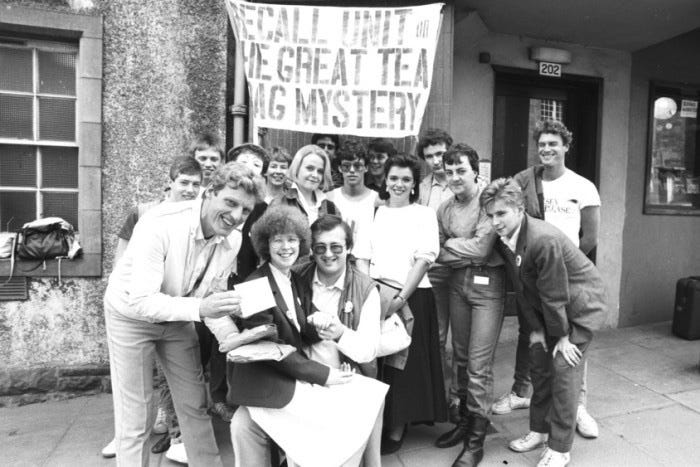
At the time, I was appearing in a musical called The Mixter-Maxter Factor. Franklin had been to see it. Late one evening, after the show had come down, I was sitting on the raised kerb by my bus stop on the Royal Mile when a car pulled up. The window wound down and there he was, “I was just thinking,” he said, “How would you like to be in next year’s play? I’ll write a part for you.”
At that point my bus arrived and I boarded thinking, ‘How many times have I heard that before?’ I never gave it another thought. Some months later, however, a package arrived in the post from the Middleham Theatre Company – it was a script entitled Recall UNIT or The Great Tea-Bag Mystery and there, beside the character Jimmy in the character list was my name.
The covering note asked me to have a read and sign the enclosed contract if I wanted the part. As Jon Pertwee’s third Doctor was my era of the Doctor Who, I didn’t have to think twice, especially as the original plan was for Pertwee and Nicholas Courtney to reprise their roles too, alongside Franklin and John Levene – the Doctor, Brigadier, Captain and Sergeant would be back in service.
The script, for those who have never seen the piece, was a wonderful mixture of the surreal and the absurd, intertwining the actors’ real life personas with their characters; at one point, if my memory serves, out of work actors Franklin and Levene are hired to reprise the roles of Yates and Benton to help save the world. The tag-line read: ‘Dr Who grapples with Mrs Thatcher on The Falklands’. Sort of says it all.
As with any show, the original cast was not the one that made it into rehearsal the following year. By then one actor had been swapped out when he decided not to be involved and the scheduled appearance of Pertwee as The Doctor on 24 August had be changed to an appearance by the Supreme Dalek, the one and only John Scott Martin – Pertwee had a diary clash, he’d been booked to appear as Worzel at the Glasgow Garden Festival just as he was supposed to be materialising on stage.
Similarly, Courtney wasn’t available and so the Brigadier became Major Molesworth. Courtney did however record some lines as the Brigadier in a phone call, which was then written into the action on stage.
The first day of rehearsals, in a church hall on Albion Place, Leith, was the usual awkward mix of nerves, excitement and fear for the actors involved. By then I knew my character would be wearing a kilt and was one of three locals to fall under the control of evil influences and be transformed, at one point, into evil Dragoids – this involved the actors concerned donning a pair of Doc Martens and a tutu. Yes, remember I used the words ‘absurd’ and ‘surreal’.
Even at 19, I knew I didn’t particularly want images of that scene circulating for the rest of my life (Dragoids really weren’t pretty) and so I had a clause written into my contract that I wouldn’t have to appear in any of those production shots. That scene, as I recall, would create a lot of problems later, but I’m jumping ahead.
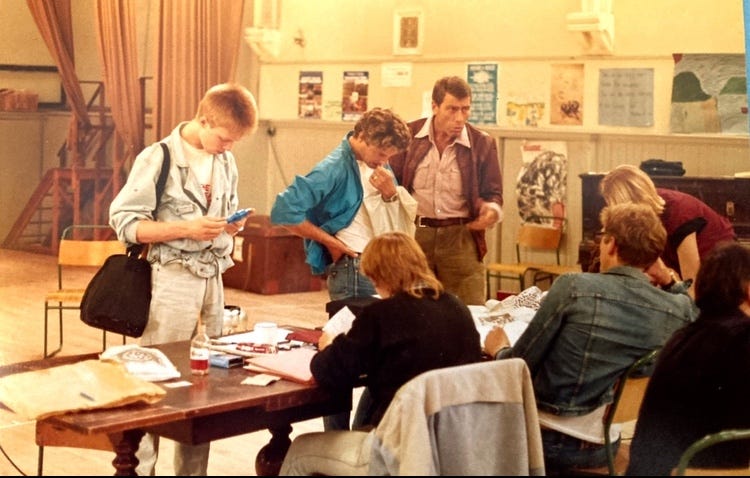
As the cast gathered on that first day, introductions were made. I already knew David Roylance who was playing Hamish and Graham Smith who was playing Alastair, as we’d already appeared in a number of plays together.
Also in the hall were the late Paul Holness, a street performer and mime artist who would be the white-faced Silent Stephen in the production, London-based actor Kevin Philpotts who played Tim, also no longer with us, and Glynn Dack, from Birmingham, who played the unlikely named Stallion. He was a martial arts expert, I discovered, not an actor.
The cast was completed by Lene Lindewall, a wonderful Swedish actress, as Miss Begbo, and Richard Kettles as Major Molesworth. As we all mingled and introduced ourselves to Stage Manager Philippa Malbon, DSM and Technical Director Christopher Corner and each other, only one person was missing, Levene, he made his entrance with son Jason in tow some time later having been delayed.
They say you should never meet your childhood heroes, by the end of Recall UNIT’s run, I would understand why – it turned out to be a less than smooth experience. The initial rehearsals went well enough until the production’s musical numbers had to be worked on; a duet of Sisters by Yates and Benton, both in drag (disguise), left Levene less than enamoured.
Franklin, also directing, ensured the rehearsal process was a painless affair as far as I was concerned and the company, though young, were professional and focussed, pulling the piece together in far less time than you might imagine – rehearsals lasted two weeks.
By the end of the first week there was time to let our hair down and relax as a flat bed lorry pulled up outside the rehearsal hall. It was time to take part in the Edinburgh Festival Fringe Cavalcade.
We would travel through the city on this lorry, dressed in costume and accompanied by a life size TARDIS and a not quite life-size Dalek nick-named Flossy, operated by our technical script advisor George Cairns. A short clip of the cast on the ‘float’ heading along Princes Street as Philpotts sings High Hopes can be found on YouTube, I believe.
Around that time, word had come through that the venue for the show, originally a make-shift studio theatre (converted nightclub) at the Edinburgh Playhouse, had been double-booked. The search for a new venue began, thankfully a deal was quickly done with the 500 seat Moray House Theatre (long gone) and we all spent a day adding stickers with the new details to hundreds of posters and flyers.
At Moray House, Fringe Venue 5, a far superior space than the original venue, Recall UNIT would run twice a day from 20-25 August 1984, with previews on 17 and 18 August.
The ‘get-in’ at the theatre hit a snag or two though, the main one being that the TARDIS we’d hoped might appear on stage was too tall. Instead it was set up in the foyer for the fans to photograph. The other snag was that the unrest that had been brewing among some in the company who were less than impressed by some elements of the production, erupted.
A confrontation between those creatives and the director resulted in the Musical Director being released from his contract the day before the show opened. A replacement was required and Iain Johnstone, who was MDing another show I was appearing in at the time, graciously agreed to take on the challenge and was brought onboard.
Recall UNIT was a long show, running at just over two hours, and we did two performances a day 10.30am and 2.45pm, which meant that with the evening show, both Johnstone and I were doing three shows a day. Being ‘on stage’ for just over seven hours a day was knackering, and not something I have done since. It took about two months to recover. But I digress.
If the departure of the original MD was a warning shot fired across the bows of some, the next problem that had to be accommodated was Levene’s inability to learn lines. Consequently, when the show opened, there were lines written on props, bits of scenery and even the tea-pot at the heart of The Great Tea-bag Mystery – which worked well enough until the last performance when they all suddenly disappeared and the audience were treated to some ad libbing as Yates turned to Benton and said, ‘It’s your line Sgt Benton and I’m waiting on it.’ Benton got the right line on the third attempt. Cue much hilarity. We weren’t laughing backstage.
With the show up and running, things settled in and the company grew close, as companies do, to the point that one of the stars felt comfortable enough to share with other cast members thoughts on their performances, how they could improve them, or indeed whether it was worth their time trying.
It didn’t go down well and ensured the rest of the company became even closer. It was all so unnecessary and, no doubt driven by insecurity, spoiled what should have been an enjoyable run. Spirits were lifted, however, when John Scott Martin arrived to play the Supreme Dalek. He joined the company on stage before the show, walked through his moves, ran through his lines and was brilliant. He was a delight, a gentleman and a real legend.
Despite the backstage roller-coaster and the somewhat bizarre nature of the show, a political satire at heart, audiences seemed to love it – even if many were left with a look of bemusement on their faces by the curtain fell.
Looking back, I wouldn’t have missed it for anything. There’s nothing like a bit of drama to make you up your game and it was the start of a great friendship with one of my childhood heroes that lasts to this day. Indeed, many years later, I had the pleasure of hiring Franklin to star in a production I was directing. He was, of course, brilliant in the role.
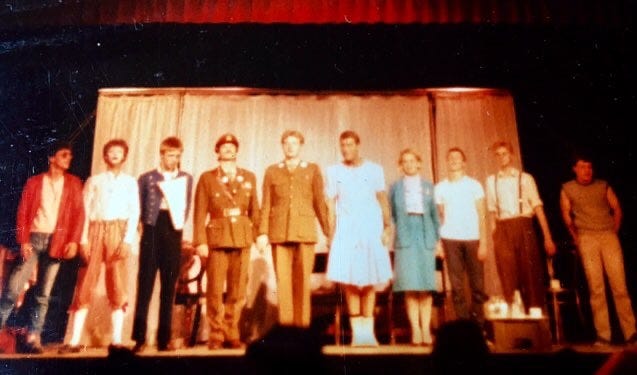
Recall UNIT was my professional acting debut, when my fee came through I remember thinking, ‘Well, I got away with it.’ That has been my outlook on life ever since.
A version of this piece first appeared in the fund-raising magazine TARDIS based on an article originally published in Marvel’s Doctor Who Monthly.




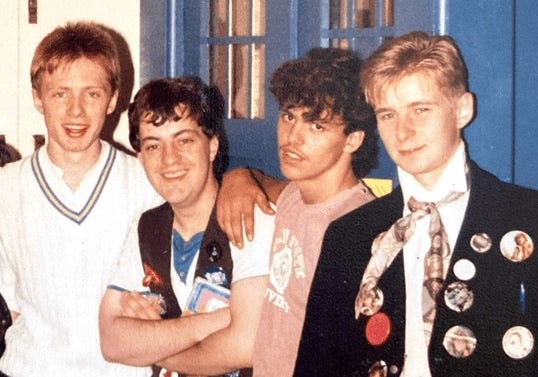

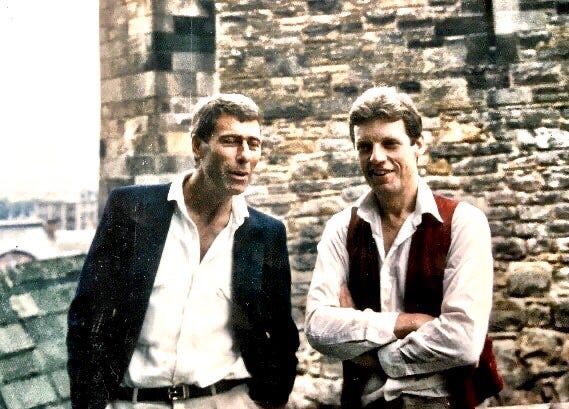
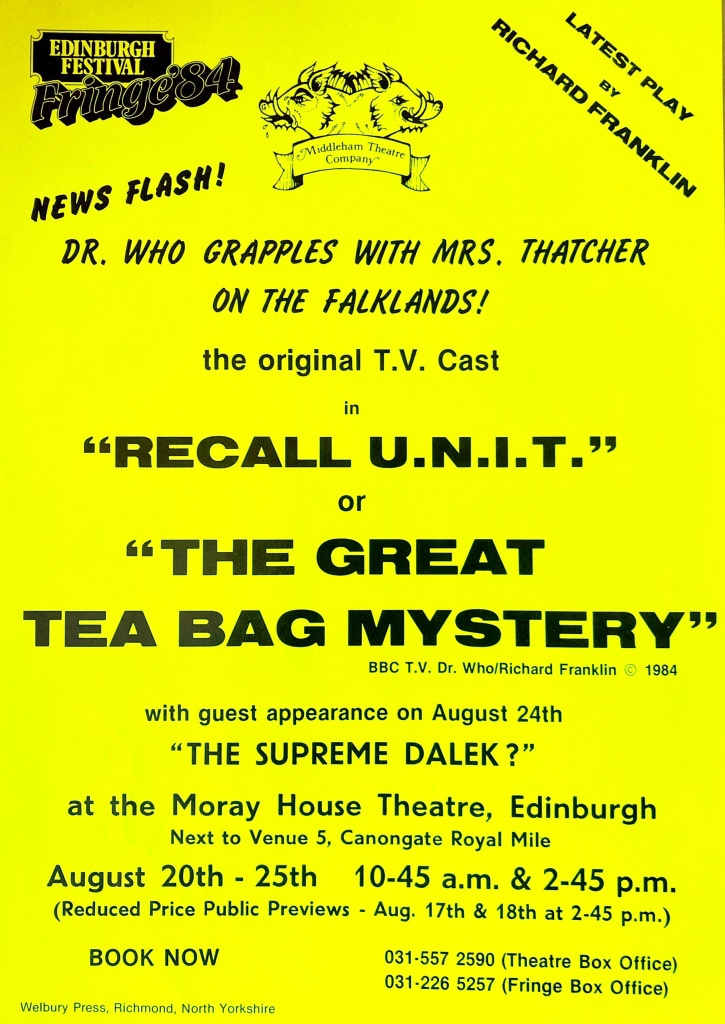
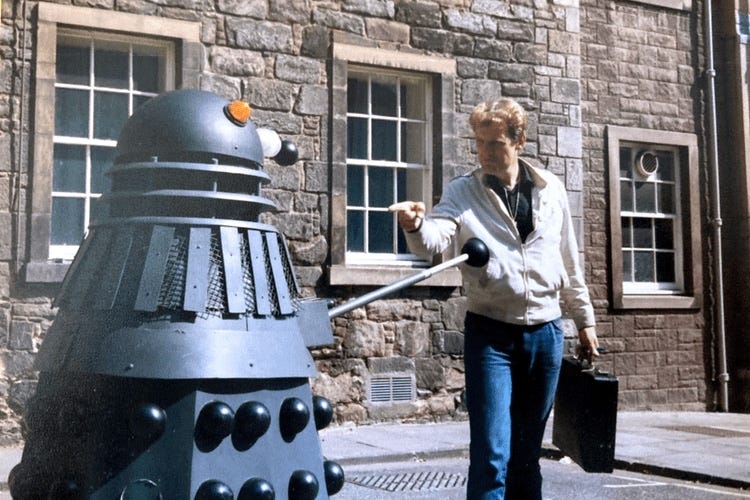
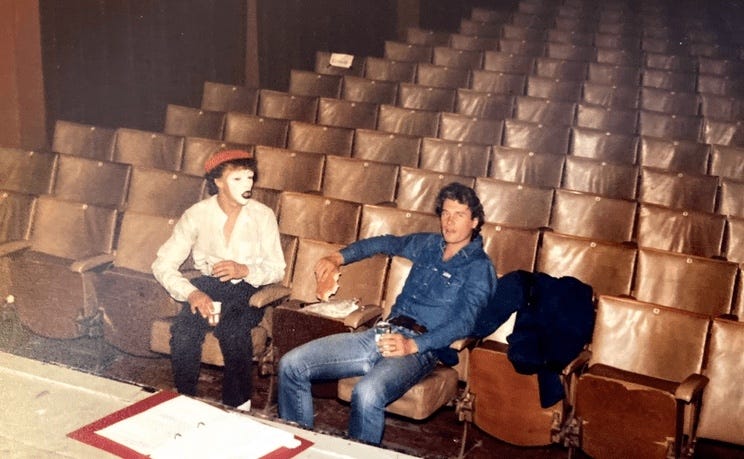
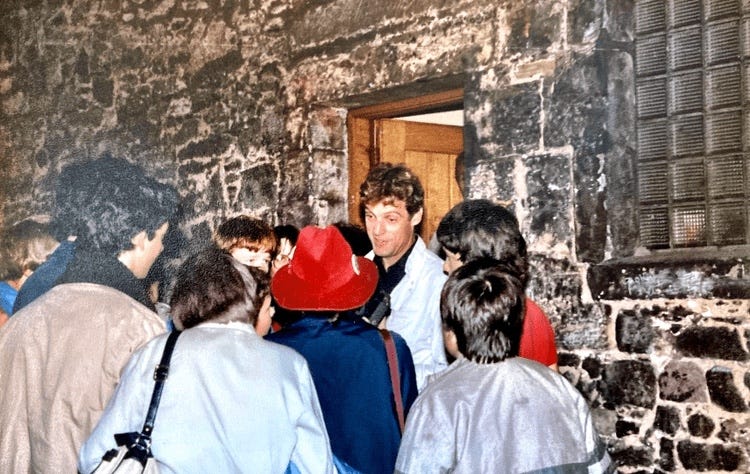
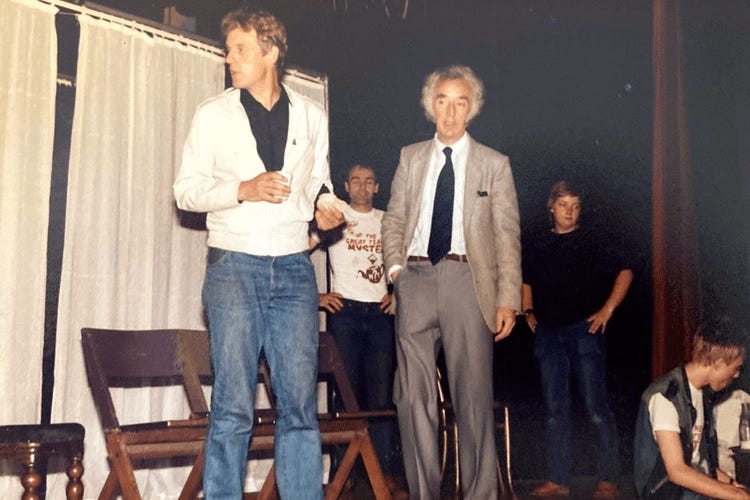
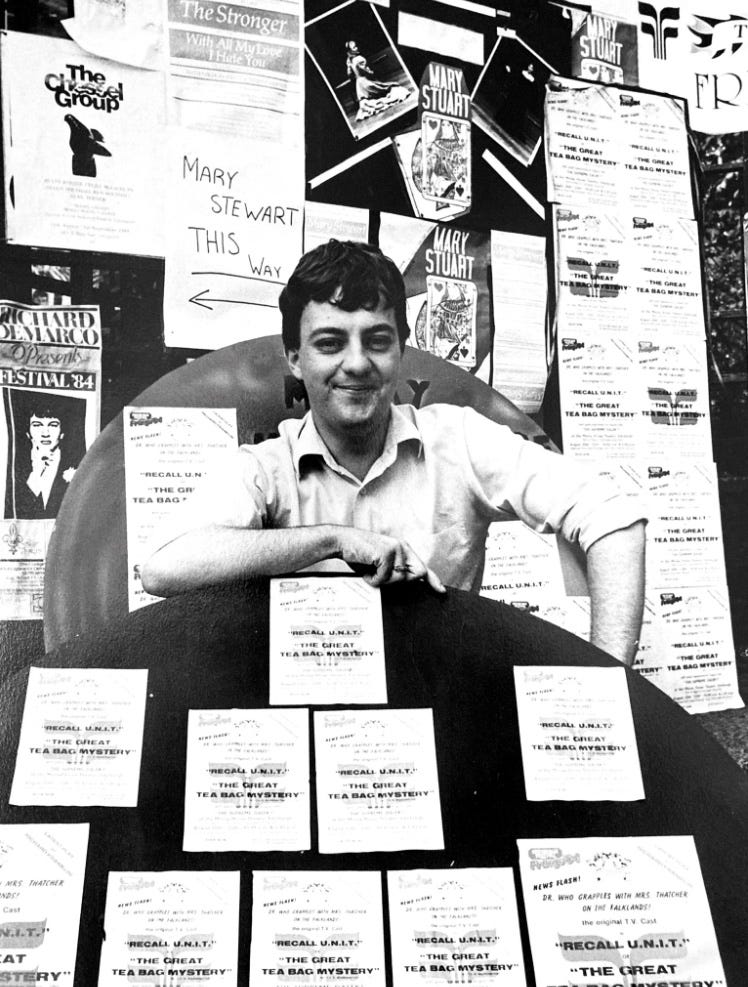
Nice to see some familiar faces in the photos. “Wee Graham” being one of them. Did he not end up in an episode of Dr Who years ago?
Either I'd forgotten some of the background details of "Recall Unit" or, given my general "hanger on" status at the time, I simply wasn't aware of some of the last-minute changes. A fascinating trip down memory lane, though thankfully there isn't much photographic evidence that I was there! 😉
You made a good call on the Tutu photography.
Just a thought: given how big and important Doctor Who now is to the BBC as a global brand, what would the chances of such a show being made now?